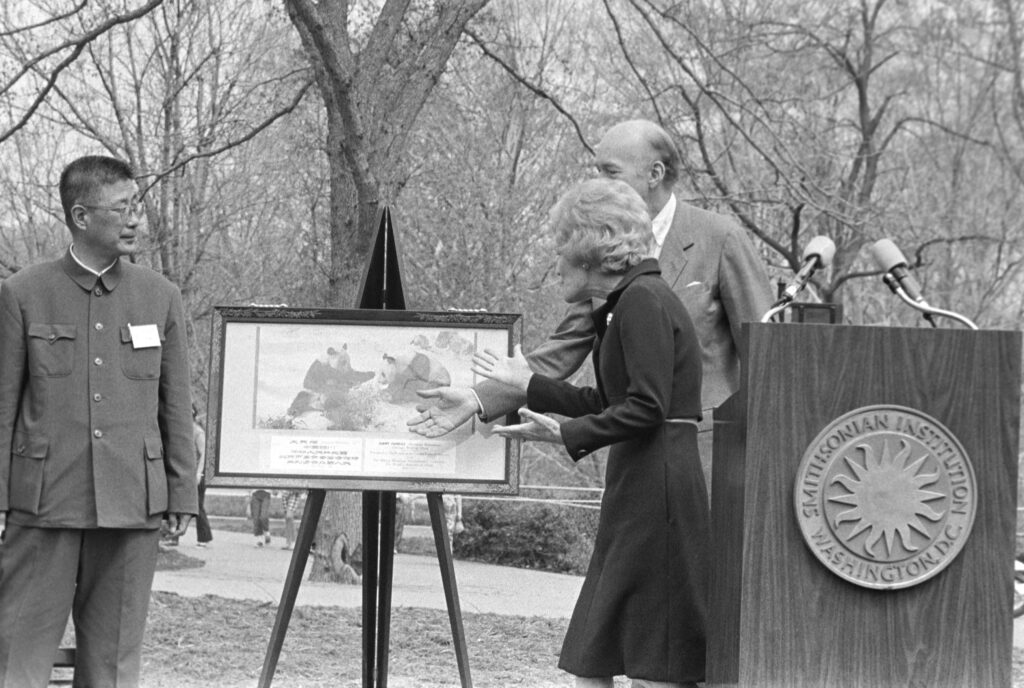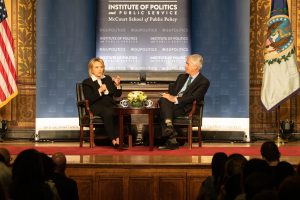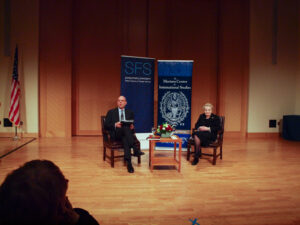In an era of international political tension, students hope that pandas at the National Zoo will improve discussions on campus about the United States’ relationship to China.
On Oct. 15, two giant pandas arrived in D.C. aboard the “FedEx Panda Express” plane from Chengdu, China, making headlines in local, national, and international networks including Washington Post, NPR, and France24.
Last year, a family of three giant pandas departed from the National Zoo after the zoo’s contract with the China Wildlife Conservation Association (CWCA) expired. The departure of the pandas marked the end of a symbolic tie between the U.S. and China, which began in 1972. There was debate over what this departure meant for U.S.-China relations, however, the zoo and the CWCA made a new agreement in May 2024. Now the pandas have made a swift return to D.C. in the form of two new fluffy friends: Bao Li and Qing Bao.
 Photo courtesy of Roshan Patel/ Smithsonian National Zoo & Conservation Biology Institute
Photo courtesy of Roshan Patel/ Smithsonian National Zoo & Conservation Biology Institute
Julio Wang (SFS ’25), who grew up in Shanghai and works for the Georgetown Initiative for U.S.-China Dialogue on Global Issues, is especially excited about the pandas’ arrival. Wang thinks friendly exchanges between China and the U.S. need more attention at Georgetown, where students often have a more competitive approach to talking about relations between the two countries.
As editor-in-chief of the Georgetown Journal of International Affairs, Wang receives frequent submissions from students about U.S.-China relations.
“I hear students who seem focused on winning strategic competition for the U.S.,” Wang said. “But at Georgetown, we are supposed to be innovating as a center of international relations policymakers, not repeating the idea that one country succeeds at the expense of the other.”
Wang thinks that frequently talking about Chinese culture, people, and even pandas can help students gain a deeper understanding of China, which can translate to better policy ideas rooted in dialogue rather than rivalry.
He suggests looking at travel blogs about China, watching Chinese movies, and meeting friends from China to talk about games, sports, and pop culture. When the panda exhibit opens to the public in January, Wang recommends that students learn more about their value to Chinese culture while they plan trips to the National Zoo.
“I have lived in both places, and I have found that the U.S. and China are more similar than they are different,” Wang says. “To really work, diplomacy needs to start at the people level before the policy level.”
SFS Vice Dean Mark Giordano said China started practicing panda diplomacy as early as the Tang Dynasty for the same reason.
 Photo courtesy of the Richard Nixon Presidential Library
Photo courtesy of the Richard Nixon Presidential Library
“The pandas are a goodwill gesture,” Giordano said. “They allow the U.S. and China to have some kind of exchange and open the door when it is politically impossible in the U.S. to say something good about China.”
Pandas are a valuable gift not only because they are indigenous to China, but also for the ideas of peace and friendship they traditionally represent. By offering a panda as a gift, China extends that message to other countries.
Giordano said that transporting the pandas and acclimating them to their new habitat is also a costly undertaking. That investment—as well as the cultural significance—is part of why pandas reflect China’s standing with other countries. These difficulties in moving the pandas also led to concerns following China’s decision not to renew the National Zoo’s contract for the pandas Tian Tian, Mei Xiang, and Xiao Qi Ji, who left the zoo in November 2023.
“China had to make an effort to take the pandas back, so it felt like a bad sign,” Giordano said. “But then that they made the effort to bring them back again is even more exciting. It’s sort of a ray of hope, that quick turnaround.”
Terry Li (SFS ’26) watched the U.S.-China relationship evolve while living in Shanghai and San Francisco before coming to Georgetown to study International Political Economy and Diplomatic Studies. Li agrees with Wang that at Georgetown, classes about China and the U.S. may focus too heavily on policy.
“I feel that at Georgetown, students and even faculty are very practical. But in terms of U.S.-China relations, you just simply cannot ignore the different layers,” Li said. “Washington and Beijing have disagreements on a wide range of topics, but it should not affect the communication between the people of the two countries.”
Li, Wang, and Giordano all plan to visit the pandas this winter. Wang says that the pandas will be great teachers as well as an adorable distraction from the stresses of college life.
“We love pandas. American people love pandas,” Wang said. “Whichever political attitude you have, you would like to see some pandas. They are so cute and fluffy. And they are one way to learn about a country on the other side of the Pacific Ocean without the filter of policy.”






